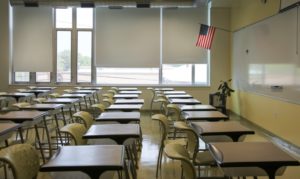
An appeals court halts student loan debt forgiveness, Canada bans the sale of handguns, and more…
IN THE NEWS
- A federal appellate court temporarily halted President Joseph R. Biden’s plan to forgive up to $20,000 in federal student loan debt for millions of borrowers. The court’s order blocking student loan cancellation remains in effect until the court rules on an emergency request by six states to stop the plan permanently. White House Press Secretary Karine Jean-Pierre encouraged eligible borrowers to continue to apply for debt relief, explaining that the order “merely prevents debt from being discharged until the court makes a decision.”
- A nationwide freeze on the sale, purchase, and transfer of handguns in Canada took effect, building on an earlier ban on handgun imports into the country. Canadian Prime Minister Justin Trudeau first announced the handgun freeze in May. Trudeau added that the Canadian legislature is currently debating a bill that would become the strongest gun control legislation in decades. In a press release about the gun freeze, Trudeau stated that “when people are being killed, when people are being hurt, responsible leadership requires us to act.”
- The U.S. Department of Education issued final rules designed to protect veterans from predatory recruitment practices, enhance prison education programs, and increase accountability when colleges and universities change ownership. Specifically, the Education Department will allow incarcerated students to access Pell Grants, which are a type of federal loan for low-income individuals. The new rules also implement a provision of the American Rescue Plan intended to prevent for-profit colleges from counting tuition from veteran students towards the “90/10 rule,” which requires that for-profit colleges obtain 10 percent of their revenue from non-federal sources. In addition, the Education Department clarified requirements institutions must follow to prevent improper financial incentives when there is a change in university ownership.
- A federal appellate court upheld the Biden Administration’s interim calculation of the social cost of greenhouse gas emissions. This figure monetizes the effect that one metric ton of greenhouse gas, such as carbon or methane, has on society, accounting for “agricultural productivity, human health, property damage from increased flood risk, and the value of ecosystem services.” The Biden Administration requires agencies to assess the net cost of greenhouse gas emissions that may result from a proposed regulation by using the social cost figure. The court concluded that the thirteen states who challenged the Biden Administration’s figure were ineligible to bring the lawsuit because their citizens were not directly harmed by the Administration’s social cost calculation.
- The Centers for Medicare & Medicaid Services (CMS) imposed stricter accountability standards on nursing homes with a history of poor performance. Under the new standards, CMS will consider terminating funds for certain facilities with repeated deficiencies, increase monetary penalties on facilities that fail to improve, and monitor “graduates” of the enhanced scrutiny program for a period of three years. CMS issued the revisions as part of the Biden Administration’s initiative to improve the safety and quality of nursing homes following over 200,000 staff and resident deaths during the COVID-19 pandemic.
- A Biden Administration rule that increases requirements to source federally-obtained goods domestically took effect. The rule strengthened the Buy American Act, which governs how federal agencies use their funding, and is part of the Administration’s strategy to increase domestic manufacturing and reduce reliance on foreign goods. The rule raises the domestic content threshold for federal procurements from 55 percent to 60 percent in 2022, then will continue to raise this threshold to 65 percent in 2024 and ultimately to 75 percent in 2029. Livia Shmavonian, director of the Made in America office, stated that these increases aim to “[leverage] federal purchasing power to invest in American industry and all of America’s workers.”
- The U.S. Fish and Wildlife Service (FWS) designated the emperor penguin as a threatened species under the Endangered Species Act. Rising global temperatures, the FWS found, are destroying the emperor penguin’s sea-ice habitat, placing the species in danger of extinction in the foreseeable future. FWS Director Martha Williams warned that this determination is part of a “growing extinction crisis” caused by climate change and that the status of the emperor penguin should serve as “an alarm bell but also a call to action.”
- The U.S. Department of Transportation released guidance on the prevention of roadway fatalities among “vulnerable road users.” Vulnerable road users, a group that includes pedestrians, cyclists, and people who use wheelchairs, accounted for approximately 20 percent of people killed in car crashes in 2021. The guidance clarifies that the Bipartisan Infrastructure Law requires states to complete Vulnerable Road User Safety Assessments in which they “identify areas of high risk to vulnerable road users, and determine what safety improvements will mitigate these safety risks.”
WHAT WE’RE READING THIS WEEK
- In a forthcoming California Law Review article, Andrew Hammond, a professor at University of Florida Levin College of Law, argued that the American welfare state is particularly vulnerable to climate disasters. Hammond noted that the federal government has failed to provide public benefits in a timely and accessible manner and warned that it will continue to do so as the climate crisis intensifies. Hammond recommended that policymakers enact legislation that makes additional funding available automatically after disasters and makes it easier for vulnerable Americans, including children, disabled persons, and non-citizens, to access disaster benefits.
- In an article in the Yale Journal on Regulation, Robin Craig, professor and trustee chair at the University of Southern California Gould School of Law, argued that regulators of marine aquaculture should give greater consideration to how the industry can support U.S. climate goals. The ocean-cultivation of shellfish and kelp, Craig found, provides numerous benefits—including food security, carbon capture, and the improvement of water quality—that can help the United States mitigate and adapt to the effects of climate change. Craig urged regulators to promote the expansion of shellfish and kelp aquaculture through a streamlined permitting process and financial incentives.
- In a Boston Review essay, Lisa Heinzerling, a professor at Georgetown University Law Center, argued that the U.S. Supreme Court is set to announce decisions that will undermine the foundations of an effective federal government. Heinzerling predicted that in the upcoming term, the Supreme Court will endorse the major questions doctrine, which says that agencies cannot regulate major political or economic issues unless Congress has clearly authorized them to do so. Heinzerling also warned that the Supreme Court may strike down statutes that prevent the President from removing high-level agency officials from their positions without good cause. Heinzerling argued that both developments would “systematically erode the legal basis of effective governance” by restraining agency autonomy and authority.
EDITOR’S CHOICE
- In an essay in The Regulatory Review, Joseph Blocher and Darrell A. H. Miller, professors at Duke Law School, argued that, although constitutional law has been the cornerstone of firearms scholarship historically, firearms scholars have much to learn from regulatory scholarship. Blocher and Miller noted that the firearms debate often focuses on a “limited set of values—public safety and individual liberty—rather than the full panoply of metrics that the keeping and bearing of arms affect.” Blocher and Miller explained that insights from regulatory scholarship regarding risk and cost-benefit analysis could help firearms scholars address the wide array of factors implicated by firearms policy more effectively.



